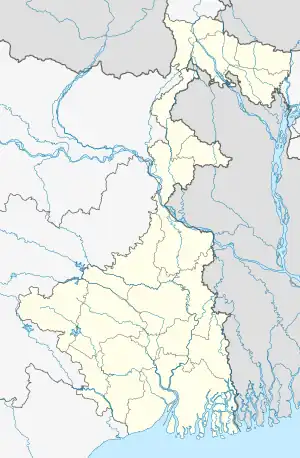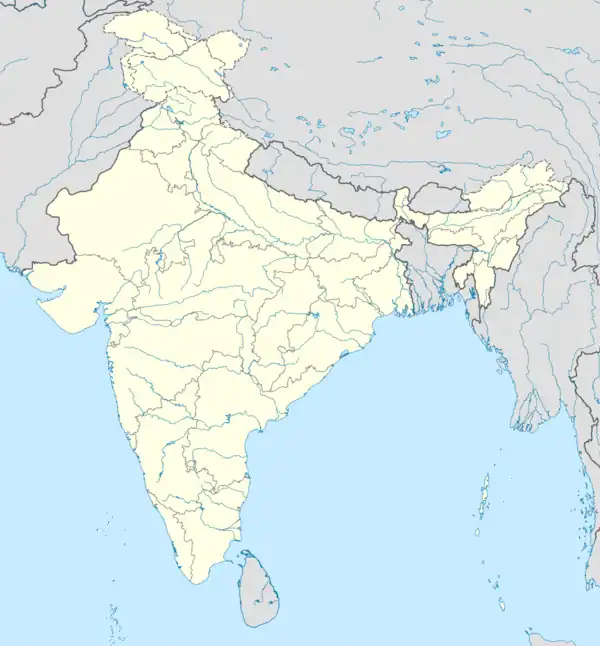Raghunathchak | |
|---|---|
Census Town | |
 Raghunathchak Location in West Bengal, India  Raghunathchak Raghunathchak (India) | |
| Coordinates: 23°35′40″N 87°07′26″E / 23.594361°N 87.12382°E | |
| Country | |
| State | West Bengal |
| District | Paschim Bardhaman |
| Area | |
| • Total | 0.87 km2 (0.34 sq mi) |
| Population (2011) | |
| • Total | 6,006 |
| • Density | 6,900/km2 (18,000/sq mi) |
| Languages* | |
| • Official | Bengali, Hindi, English |
| Time zone | UTC+5:30 (IST) |
| PIN | 713359 |
| Telephone/ STD code | 0341 |
| Vehicle registration | WB |
| Website | paschimbardhaman |
Raghunathchak is a census town in the Raniganj CD block in the Asansol Sadar subdivision of the Paschim Bardhaman district in the Indian state of West Bengal.
Geography
MC: Municipal Corporation, CT: census town, N: neighbourhood, R: rural centre
Owing to space constraints in the small map, the actual locations in a larger map may vary slightly
Location
Raghunathchak is located at 23°35′40″N 87°07′26″E / 23.594361°N 87.12382°E.
Jemari (J.K. Nagar Township), Belebathan, Murgathaul, Amkula, Egara, Sahebganj, Raghunathchak and Ballavpur form a cluster of census towns on the western and southern side of Raniganj. Banshra and Baktarnagar are adjacent to Raniganj on the eastern side.[1]
Urbanisation
According to the 2011 census, 83.33% of the population of the Asansol Sadar subdivision was urban and 16.67% was rural.[2] In 2015, the municipal areas of Kulti, Raniganj and Jamuria were included within the jurisdiction of Asansol Municipal Corporation.[3] Asansol Sadar subdivision has 26 (+1 partly) Census Towns.(partly presented in the map alongside; all places marked on the map are linked in the full-screen map).
Demographics
According to the 2011 Census of India, Raghunathchak had a total population of 6,006 of which 3,149 (52%) were males and 2,857 (48%) were females. Population in the age range 0–6 years was 784. The total number of literate persons in Raghunathchak was 3,768 (72.16% of the population over 6 years).[4]
*For language details see Raniganj (community development block)#Language and religion
According to the 2011 census, the urban agglomeration (UA) centred upon Asansol had a population of 1,243,414. In addition to the erstwhile municipalities of Kulti, Jamuria, and Raniganj subsequently incorporated into the Asansol Municipal Corporation, the agglomeration included the census towns of Amkula, Baktarnagar, Ballavpur, Bhanowara, Domohani, Egara, Jemari (J.K. Nagar Township), Majiara, Murgathaul, Raghunathchak, Sahebganj and Topsi, and also Charanpur, an outgrowth of Jamuria.[5][3]
As of 2001 India census,[6] Raghunathchak had a population of 5,477. Males constitute 54% of the population and females 46%. Raghunathchak has an average literacy rate of 61%, higher than the national average of 59.5%: male literacy is 69%, and female literacy is 52%. In Raghunathchak, 13% of the population is under 6 years of age.
Infrastructure
According to the District Census Handbook 2011, Bardhaman, Raghunathchak covered an area of 0.87 km2. Among the civic amenities, it had 12 km roads with open drains, the protected water-supply involved overhead tank, tubewell, borewell. It had 291 domestic electric connections. Among the medical facilities it had were 1 hospital, 4 medicine shops. Among the educational facilities it had were 2 primary schools, the nearest middle, secondary school at Ballavpur 0.5 km away, the nearest senior secondary school at Raniganj 3 km away. It had 1 non-formal education centre (Sarba Siksha Abhiyan).[7]
Education
Raghunathchak has two primary schools.[8]
References
- ↑ "Census of India 2011, West Bengal: District Census Handbook, Barddhaman" (PDF). Map of Raniganj CD Block, page 215. Directorate of Census Operations, West Bengal. Retrieved 31 August 2018.
- ↑ "District Statistical Handbook 2014 Burdwan". Table 2.2, 2.4(a). Department of Statistics and Programme Implementation, Government of West Bengal. Retrieved 4 September 2018.
- 1 2 "The Kolkata Gazette" (PDF). Notification No. 335/MA/O/C-4/1M-36/2014 dated 3 June 2015. Department of Municipal Affairs, Government of West Bengal. Retrieved 4 September 2018.
- ↑ "2011 Census – Primary Census Abstract Data Tables". West Bengal – District-wise. Registrar General and Census Commissioner, India. Retrieved 18 February 2017.
- ↑ "Constituents of Urban Agglomerations having population 1 lakh and above" (PDF). Provisional Population Total, Census of India 2011. Government of India. Retrieved 27 August 2018.
- ↑ "Census of India 2001: Data from the 2001 Census, including cities, villages and towns (Provisional)". Census Commission of India. Archived from the original on 16 June 2004. Retrieved 1 November 2008.
- ↑ "District Census Handbook Barddhaman, Census of India 2011, Series 20, Part XII A" (PDF). Section II Town Directory, Pages 1179-1210; Statement I: Status and Growth History, Page 1179; Statement II: Physical Aspects and Location of Towns, Page 1188; Statement III: Civic and other Amenities, Page 1191; Statement IV: Medical Facilities, Page 1196; Statement V: Educational, Recreational and Cultural Facilities, Page 1200; Statement VI:Industry and Banking, Page 1209. Directorate of census Operations V, West Bengal. Retrieved 14 May 2020.
- ↑ 7th All-India School Education Survey 2003 Archived 2007-09-27 at the Wayback Machine
